
SUbText E-Newsletter Spring 2022
In this Issue
Good News
Department News
What a year it was! From pandemic pivoting to returning to campus, from Zoom rooms to masked classrooms, this year marks more than just a transition for us. This was a year of innovations and new accomplishments!
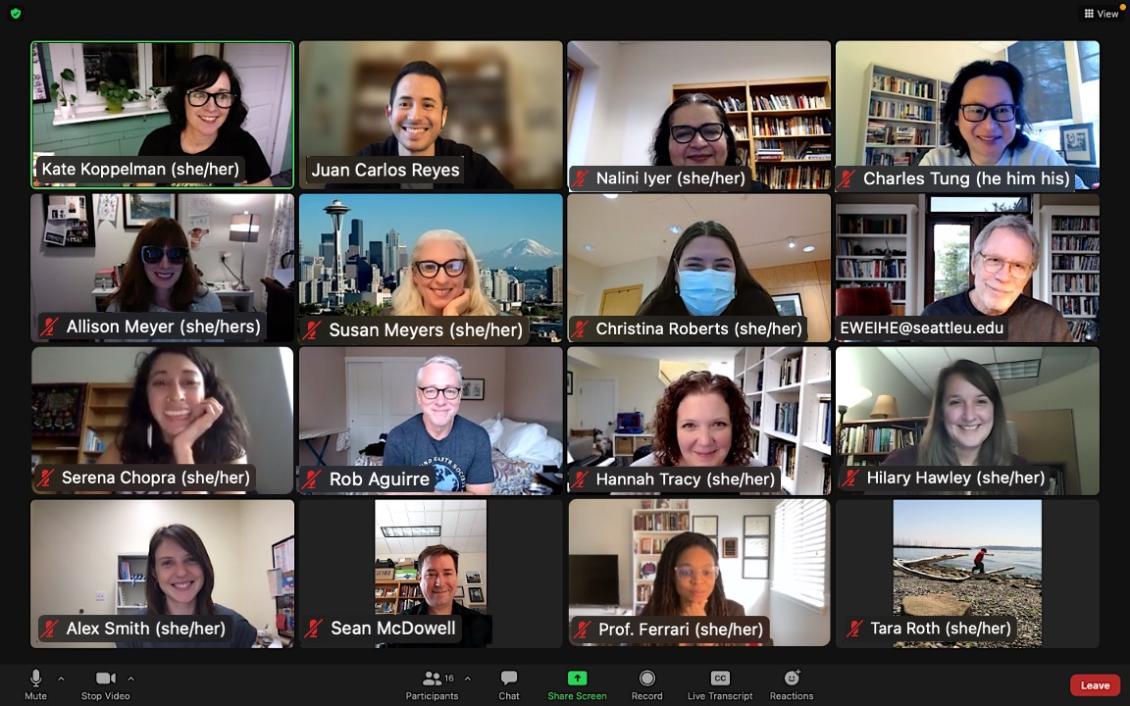
English Department at our monthly Zoom faculty meeting, discussing the finer points of self-governance, English curriculum, and Inclusive Teaching.
Welcome from Department Chair Kate Koppelman
By Dr. Kate Koppelman , Chair
Hello to alumni and friends of the English Department!
I’m writing this welcome on a glorious spring day in Seattle—the lilac is blooming, the dog is lounging in the sun, and our newest cat, a long-haired tortie named Penny, has climbed the tree in the backyard, testing out her cat-like skills. I sincerely hope that this finds you making space in your lives for pause and for observation—as the world “gets back to normal,” it sometimes seems as though introspection and reflection lose their value. As graduates from and friends to the English department, I know that you each understand what those skills can bring to us individually and collectively. It is in that spirit that this newsletter comes to you.
You’ll find here updates about our programs, good news about student and faculty achievements, and some reflection upon what we are doing and have done to manage and thrive through these last two years. In particular, we are thrilled to be able to update you on the fundraising campaign launched by alums Carlito Umali and Kahlia Keita, class of 2008, which has resulted in the development of a mentoring program for BIPOC majors. Our newest faculty member, Dr. Carlyn Ferrari, is working with Carlito and Kahlia to launch this program.
In addition to choosing Zoom backgrounds to fit any occasion, and reading more mystery novels than I can count, I’ve considered my time interacting with students to be some of the most gratifying time I’ve spent during the pandemic. Our students are incredibly resilient but have also been willing to share their vulnerabilities and isolation with us—I and my colleagues are humbled by this trust and forever grateful for it.
As you read through the newsletter, please see it as also an invitation for you to share with us where you are, what journeys you have undertaken, what challenges you have faced, and what successes you have enjoyed. We are made only stronger by our community. Thanks to each of you for being part of it.
With gratitude,
Kate Koppelman
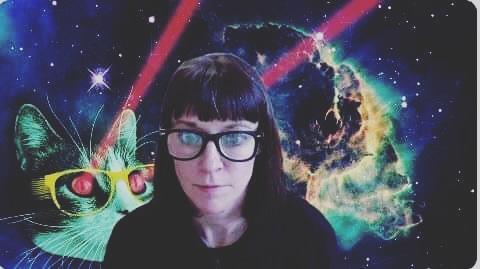
Dr. Kate Koppelman's favorite Zoom backgrounds this year have been an assortment of cats in space, sometimes with laser eyes, and almost always out of this world.
What We're Reading
Dr. Hilary Hawley, Senior Instructor, sharing about her favorites of late...
I keep recommending Seattle author Laurie Frankel’s beautiful novel, This Is How It Always Is, about how a big family comes together to support its youngest child, who was born a boy but says he wants to be a girl when he grows up. Carmen Maria Machado’s memoir-that-is-so-much-more-than-a-memoir In the Dream House employs a wealth of narrative tropes and plays with genre while also providing a personal, wrenching analysis of intimate partner abuse, trauma, and healing.
Dr. Rob Aguirre, Senior Instructor, has been reading Richard Wright’s The Man Who Lived Underground, Jill Lepore’s These Truths, and SU Alum John Englehardt’s Bloomland, and he shares...
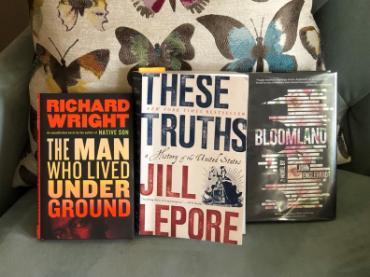 I’ve really enjoyed these three books over the past six months. SU alumnus, John Englehardt, wrote one of the best first novels I’ve read in a very long time. I hope to see more from him in the future. Richard Wright’s novel sheds a new light on one of our most important writers. And Jill Lepore’s one-volume political history of the United States reminds us of the country’s struggles to become an “ideal” without running away from the horrific and destructive impact of white supremacy and racism.
I’ve really enjoyed these three books over the past six months. SU alumnus, John Englehardt, wrote one of the best first novels I’ve read in a very long time. I hope to see more from him in the future. Richard Wright’s novel sheds a new light on one of our most important writers. And Jill Lepore’s one-volume political history of the United States reminds us of the country’s struggles to become an “ideal” without running away from the horrific and destructive impact of white supremacy and racism.
Dr. Susan Meyers, Associate Professor and Director of the Creative Writing Program, shares about her recent favorites:
Following the lead of its exquisite lead essay published in The New Yorker, Michelle Zauner's Crying in H Mart is beautifully well-written breakout book by the lead singer of the band Japanese Breakfast. As haunting and moving as her music, Michelle's memoir about losing her mother and finding her own means of remaining connected with her complex cultural identity has lingered with me for weeks after reading. Highly recommended!
What has become a contemporary classic, Born a Crime, by Comedy Central's own Trevor Noah is an amazing memoir in linked-essay form, leveraging humor and raw, unflinching insight in equal measures to detail his childhood growing up mixed race in South Africa.
In linked essays set in Seattle and the Midwest, Elissa Washuta leans deeply into explorations of self, relationship, and heritage in her latest hybrid work of nonfiction, White Magic. It's wildly creative, compelling, and just marvelous.
Juan Carlos Reyes, Assistant Professor in Creative Writing, has recently enjoyed Joy Harjo’s Poet Warrior, Julio Cortazar’s Literature Classroom, and Noemi LeFebevre’s Poetics of Work, and he shares...
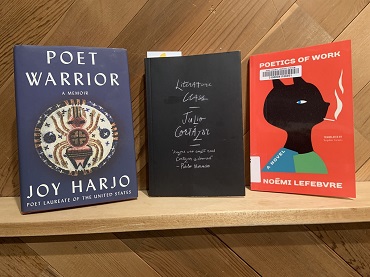 I often find myself picking up multiple books at once, largely because I sometimes am without a book and pick one up wherever I might find myself. I picked up Noemie LeFebevre’s novella in our public library as my children scoured for some of their own books, and her book struck me as a wonderfully strange depiction of a writer trying to argue for the value of creative expression when fascism takes over his country. I picked Julio Cortazar’s collection of essays on a random jaunt through a small town bookstore on the Oregon Coast, and his book is all about the craft of writing and thinking, how we talk about books, how we value storytelling in a world that is always trying to distract us. And I borrowed Joy Harjo’s memoir from my wife one night when I found myself without anything to read in the living room, and Harjo’s life story is written so compactly, it’s so its honest and gut-wrenching, and her depiction of life and lamentation is a testament to the graciousness and generosity she holds for those she loves most dearly.
I often find myself picking up multiple books at once, largely because I sometimes am without a book and pick one up wherever I might find myself. I picked up Noemie LeFebevre’s novella in our public library as my children scoured for some of their own books, and her book struck me as a wonderfully strange depiction of a writer trying to argue for the value of creative expression when fascism takes over his country. I picked Julio Cortazar’s collection of essays on a random jaunt through a small town bookstore on the Oregon Coast, and his book is all about the craft of writing and thinking, how we talk about books, how we value storytelling in a world that is always trying to distract us. And I borrowed Joy Harjo’s memoir from my wife one night when I found myself without anything to read in the living room, and Harjo’s life story is written so compactly, it’s so its honest and gut-wrenching, and her depiction of life and lamentation is a testament to the graciousness and generosity she holds for those she loves most dearly.
Dr. Allison Machlis Meyer, Associate Professor in Literature Studies, has been reading A Net for Small Fishes by Lucy Jago, a historical fiction novel based on the seventeenth-century scandal over the divorce and murder trial of Frances Howard.
Good News
Alumni Update
Alum Lily Jones (‘21) received offers from two schools for a publishing graduate program and has accepted the offer from Kingston University in London for their Publishing MA.
Alum Brandon McWilliams (‘21) was accepted to several master’s programs and will be attending Western Washington University’s MA in Environmental Studies program.
Alum Shelby Leone (‘21) has been accepted to multiple poetry MFA programs for next fall, and she plans to attend either CalArts or Naropa. Two amazing programs.
Alum Max Delsohn began an MFA in fiction this fall at Syracuse University.
This spring alum Aidan Avery is due to complete his prose MFA at the University of Arizona.
Alum Emily Mundy will also be wrapping up her poetry MFA at the University of Washington-Bothell this spring.
Alum K. Mitchell Waltos (‘21) has been accepted to the UW Master’s in Library and Information Science program.
Alum Katie Howard (‘21) was accepted into the MA program in Literature at Loyola Marymount U. She received a teaching fellowship at LMU and will be a Graduate Teaching Assistant teaching her own Core class in her second year.
Alum Sydney Haas (English and Theater double major ‘20), got into MFA programs at Pratt, Boulder, and Cal Arts, and was waitlisted at NYU, Brooklyn College, and Columbia U.
We’re so excited for these amazing alums, and we would love to hear from all of you! If you have any news to share, please feel free to email us with updates anytime!
Faculty Updates
Dr. Hilary Hawley was officially named Coordinator of the University’s Common Text program after serving as interim coordinator since 2019.
Dr. Tara Roth, Dr. Alex Smith, and Dr. Hannah Tracy received the Pilot Initiative on Anti-Racist Education: Curriculum Development Cohort Grant for their project entitled “Labor-Based Contract Grading as an Anti-Racist Pedagogical Practice.” For their grant-funded project, they facilitated a workshop for SU faculty on labor-based contract grading in Winter 2022 and are hosting a follow-up workshop for Spring quarter.
Tara Roth co-authored Throw it in the Sea, a memoir about her father, Judge Samuel Der-Yeghiayan, who is the grandson of survivors of the Armenian genocide. The memoir recounts Der-Yeghiayan's life growing up in Syria and Lebanon, his immigration to the United States, and his journey to the federal bench. This work was recently reviewed in the Jan/Feb 22 issue of the Chicago Bar Association Record. She is also serving as Interim Director of the Naef Scholars in AY 21-22.
Dr. Alex Smith was recently published in Multi-ethnic Literatures of the US (MELUS). Her article titled "Reclaiming the Street in Toni Morrison's Jazz" is part of a special issue paying tribute to Morrison, Paule Marshall, and Ntozake Shange. She also won the 2021 A&S Award for Outstanding Teaching.
Dr. Hidy Basta and Dr. Alex Smith co-authored an article “(Re)envisioning the Writing Center: Pragmatic Steps for Dismantling White Language Supremacy,” and it is forthcoming in Praxis: A Writing Center Journal. The Writing Center was awarded the Shine Award for the best place to work on campus for student employees by the Career Engagement Office; moreover, Hidy and Alex received the Supervisors of the Year Award.
Dr. Allison Machlis Meyer published an article, “Women’s Shakespeare in Seattle: Regional Performance and Spectatorship,” in a special issue on “Regional Shakespeare” for Shakespeare Bulletin. She delivered two conference papers on early modern compiled volumes, “Bound Books and Hereditary Marks” at the Sixteenth Century Society Conference and “Material Formations of Faith in Early Modern Compilation” as part of a seminar on “The Politics of Book History” at the Shakespeare Association of America. She also received an ICTC Faculty Research Fellowship for 2021-2022 for her ongoing project on book building and religious difference in the early modern period.
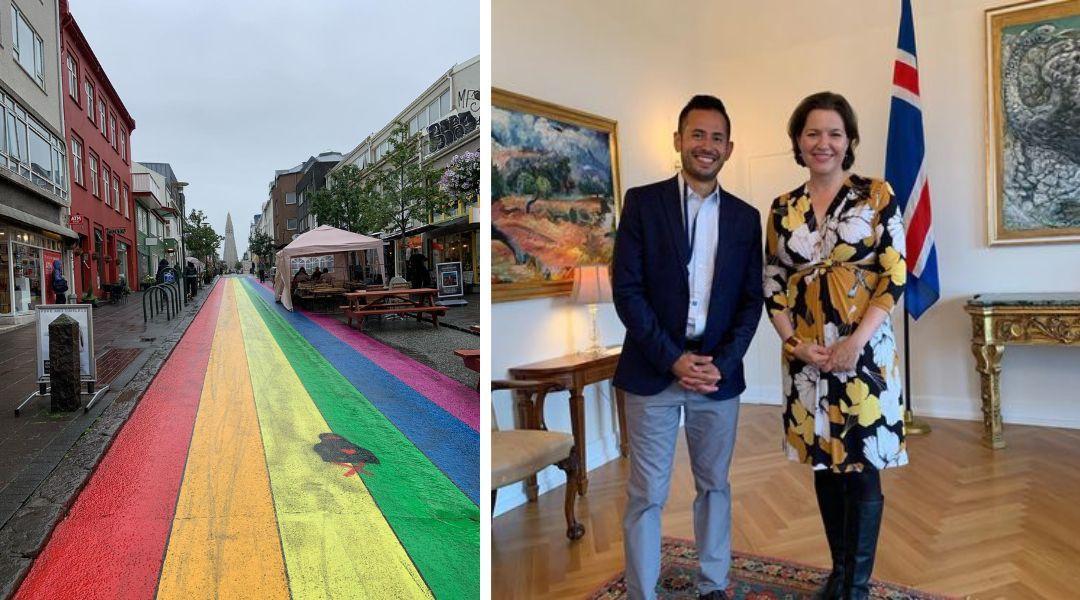
(L) The view up Rainbow Street in Reykjavik, Iceland, a walk that peaks at Hallgrimslirkja Cathedral. (R) Juan Carlos Reyes and Iceland's First Lady Eliza Jean Reid at the UNESCO Cities of Literature Wecome Ceremony & Dinner
Juan Carlos Reyes, Assistant Professor of Creative Writing, joined UNESCO delegates from around the world in Reykjavik, Iceland. He traveled on behalf of the Seattle City of Literature organization, creating collaborative opportunities for Seattle’s literary community and partner organizations in sister cities of literature. The “City of Literature” global network promotes sustainable development through literature and storytelling, and as President of the Board of Seattle City of Literature he helped steer two central projects: a strategic planning initiative the culminated in a renewed vision and mission and a mayoral candidate arts forum in which Seattle’s mayoral candidates were asked about their plans to incorporate the literature and arts communities in their economic revitalization plans. He was also a featured reader for the Hugo House’s Literary Reading Series entitled “Apocalypse.” He performed an excerpt from his novel-in-progress, Tomorrow Everyone Lives, a story that invokes the traumatization of family separation at the border while also narratively being in conversation with and critical of the superhero genre in its contemporary form.
Dr. Susan Meyers is now serving as an editor for the Journal of Creative Writing Studies and recently presented virtually at the San Miguel de Allende Writer's Conference and the Rhetoric Society of America conference. She published a story, “Visiting the Grand Canyon” in The Moving Force Journal, and her essay “Namesake” appeared in the fall issue of The Rush literary journal. She also published an article co-authored with a colleague from the Jesuit University in Mexico City, Universidad Iberoamericana in the anthology Civic Engagement in Global Contexts: International Education, Community Partnerships, and Higher Education. Two more literary essays are forthcoming this spring/summer in Hippocampus and New Orleans Review.
Dr. Serena Chopra participated in an event titled “this is all // that matters: South Asian Poets on Diaspora, Kith, Material, and Speech” through The Poetry Project’s fall reading series. She also has an exciting multi-week residency at the prestigious MacDowell arts center to work on her new manuscript this spring.
Dr. Mary-Antoinette Smith has published a book chapter, "A Classical Drama of Human Bondage: Recurrent Replications of Supplication, Enslavement, and Appeal from Antiquity through the Nineteenth Century (and Beyond)" in a collection Adaptation Before Cinema: Literary and Visual Convergence from Antiquity through the 19th Century. She also served as a panelist at a discussion on Gerald J. Beyer’s new book, Just Universities: Catholic Social Teaching Confronts Corporatized Higher Education at the National Center for the Study of Collective Bargaining in Higher Education and the Professions, hosted by CUNY Hunter College.
Dr. Nalini Iyer moderated a conversation with Thrity Umrigar, bestselling author of The Secrets Between Us, for the King County Library.
Dr. Christina Roberts received the 2021-23 Gaffney Chair with Rob Efird for their project dᶻixᵂ dxᵂɁugᵂusaϮ tiɁǝɁ swatixᵂtǝd “The Earth is Our First Teacher”: Celebrating the Legacy of taqwšəblu Vi Hilbert and Honoring Sacred Relationships with Coast Salish Lands. She also moderated a discussion in Seattle Arts and Lectures with Robin Wall Kimmerer, Distinguished Teaching Professor and Director of Center for Native Peoples at SUNY ESF, member of the Citizen Potawatomi Nation, and author of Braiding Sweetgrass: Indigenous Wisdom, Scientific Knowledge and the Teachings of Plants.
Dr. Carlyn Ferrari has been awarded the Career Enhancement Fellowship from the Institute for Citizens and Scholars, which “seeks to increase the presence of minority junior faculty members and other faculty members committed to eradicating racial disparities in core fields in the arts and humanities.” The fellowship is funded by the Andrew Mellon Foundation, whose mission is “to strengthen, promote, and, where necessary, defend the contributions of the humanities and the arts to human flourishing and to the well-being of diverse and democratic societies.” She has also received a contract for her book Do Not Separate Her from Her Garden: Anne Spencer's Ecopoetics from the University of Virginia Press, and has published an essay in Religion Dispatches entitled "What My Christian High School Taught Me About Being a Black Girl." Also in 2021, Dr. Ferrari received a Provost’s Summer Faculty Fellowship for her research project entitled “Black Environmental Imaginations”.
Dr. Charles Tung gave a paper at MLA, “Mutant Formations for Rethinking Human and Humanist Bodies,” on the panel, Speculative Orientations: Reshaping Bodies in Contemporary Science Fiction and Fantasy. He also did a podcast with Carolyn Fornoff, Jen Telesca, and Waichee Dimock for the University of Minnesota Press to accompany the release of the collection, Timescales: Ecological Temporalities across Disciplines, in which he has a chapter.
Dr. Sean McDowell published his second co-edited volume of The Variorum Edition of the Poetry of John Donne with Indiana University Press, and his book, Metaphysical Shadows: The Persistence of Donne, Herbert, Crashaw, Vaughan, and Marvell in Contemporary Poetry, has just been published by Lexington Books, an academic imprint of Rowman & Littlefield.
Dr. Bryn Gribben has received a contract from Other Words Press, an all-female independent press, for her book on music and identity, Amplified Heart: An Emotional Discography. One of the essays from this manuscript, “What To Save," was a creative nonfiction finalist for the 2021 Nashville Review Porch Prize; another essay, "We Are Devo," is in the forthcoming issue of Carcosa magazine. Additionally, Bryn's poem "Slantwise View of Simeon Solomon" was published in the spring 2021 issue of The Festival Review.
Dr. Molly Clark Hillard received an advance contract with Bloomsbury Press for her book project, Literary Subjects: the Contemporary Novel and the Return to Victorian Form.
Dr. John C. Bean, Emeritus Professor of English, has recently published the 3rd edition of Engaging Ideas: The Professor’s Guide to Writing, Critical Thinking, and Active Learning in the Classroom (Jossey-Bass, 2021). For this edition, John invited a younger scholar in writing across the curriculum (Dan Melzer of University of California, Davis) to serve as co-author. Data from ResearchGate shows that the first two editions of Engaging Ideas received more than 900 citations in the scholarly literature. According to the director of the campus writing and speaking program at North Carolina State University (Chris Anson), “More than any single text, Engaging Ideas has had a profound and lasting influence on the writing-across-the-curriculum movement in the U.S. and around the world.” Dr. Bean has also been designated a “Distinguished Fellow” by the Association for Writing Across the Curriculum. According to the Association, “This award recognizes distinguished scholars (i.e., scholars in field for at least 10 years) who have made significant contributions to the field of WAC through scholarship, service, and/or achievement. This is an award that continues beyond the year in which it was made.”
Dr. Sharon Cumberland, Emeritus Professor, participated in a poetry reading in support of the Ukranian People sponsored by Poetry Bridge of West Seattle. She joined local poets Esther Helfgott, Claudia Castro Luna, Jed Meyers, Raul Sanchez, Shankar Naryan, Carolyn Wright, Paul Nelson and others as they read their own work reflecting on this international tragedy.
In her call to action to fellow poets, Lyn Coffin wrote, “The news is terrible. The world is in peril. We know this. We are poets. Let us speak from our hearts about this, about what we see, how we feel. This may not be the best Poetry reading. The poems may not be finished or beautifully crafted. The "poems" may be short prose pieces. But let us respond honestly with full daring now, to this.” You can watch the entire reading on YouTube at Voices for the Ukrainian People.
Program Updates
SUURJ
Dr. Hannah Tracy and Tara Roth are the newest editors of SUURJ, the Seattle University Undergraduate Research Journal. This spring, the Seattle University Undergraduate Research Journal (SUURJ) is proud to announce that Volume 6 launched on June 2nd. Our authors and editors have been working hard to bring you nine fresh and thought-provoking research papers written by our own SU undergraduate students.
Our authors this year are Alex Chapman, Ruby Polani Ranoa, Claire Andrews, Brooke I. Wynalda, Jordyn Correll, Katherine Howard, Kele Tesfaye, Adina Van Etten, and Afrikaan Sahra. They were selected from among a pool of amazing applicants to have their research featured in SUURJ’s sixth annual volume. They’ve written papers in a wide range of disciplines from Literature to Environmental Science. They’ve been hard at work the past quarter getting their papers through the editing process.
Our student copyeditors have been hard at work as well! They’ve spent the last two quarters screening, selecting, and polishing the papers to make sure you, the reader, can have the very best. This year we have Stephen Leach, Joanna Labot Corpuz, Kim Diaz, Lainey Ragsdale, Lee Sasaki, Edward Voloshin, Sareena Toothaker, Jack Kuyper, Bridget Conroy, Melat Ermyas, Nicole Beauvais, and Lily Kamālamalama working behind the scenes to make SUURJ the very best it can be. They have been guided and mentored by Prof. Tara Roth and Prof. Hannah Tracy this past year and are excited to at last bring you the latest SU research.
The mission of SUURJ is to provide a platform for students of any discipline to participate in larger academic conversations by uplifting their voices and interests. With readers all over the globe, SUURJ has continued making this mission a reality. After June 2nd, you’ll be able to find Volume 6 (and all of our previous volumes) on our ScholarWorks page! https://scholarworks.seattleu.edu/suurj/
For more information about SUURJ, contact Prof. Roth and Prof. Tracy at suurj@seattleu.edu or visit https://www.seattleu.edu/artsci/departments/english/seattle-university-undergraduate-research-journal-suurj/
Departmental Honors Program
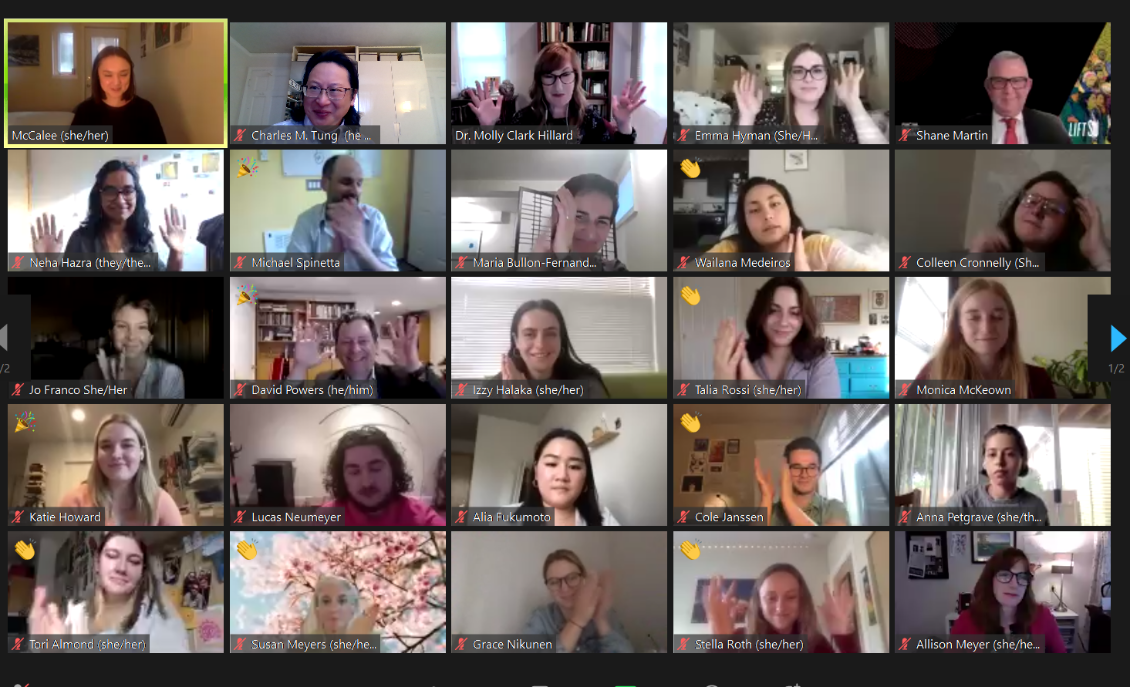
Our annual SUURA conference took place virtually with students wowing not just their classmates but also their families who were able to see their favorite SU students in thoughtful intellectual action.
Our 2021 graduating class wrote an outstanding group of projects under the direction of Dr. Molly Clark Hillard, culminating in a presentation at the annual SUURA Conference. Read on for the titles of their works:
Hayley Beaver, “Christendom’s Wet Dream: The Fantasy and Miracle of Religious Race Making and Racialized Conversion in the Late Middle Ages.”
Ella Campbell, “An Analysis of Essentialized Orientalism in Othello’s Modern Afterlives.”
Alia Fukumoto, “Greed and Hypocrisy in the Opium Trade: Gender Construction in Amitav Ghosh’s Ibis Trilogy.”
Katie Howard, “Female Virgin Saints and Chaucer’s Prioress: Performing Chaste-Based Identities in the Medieval Period.”
Erin Hunley, “Rubbernecking.”
Grace Kohler, “The Open Love Letters of Abelard and Heloise: A Woman’s Reclaiming of Sexual and Intellectual Power.”
Annika Le, “Meet Me in the Mangroves.”
Nick Loduca, “The Stray.”
Brandon McWilliams, “The Thickness of Leaves: An Urban Ecopoetics.”
Anna Petgrave, “A Precarious Position.”
Sarah Salame, “The Importance of Good Representation: A Case Study of the Works of Benjamin Alire Saenz.”
Elena Selthun, “Resurrect Your Gays: Queer Immortality and Necromantic Resistance in The Picture of Dorian Gray and Gideon/Harrow the Ninth.”
Joshua Wagner-Smith, “Children of Kaldosh: A Lost Tale of Malan.”
Literature Studies
Last year, we introduced two new 2000-level courses called Crossing Borders: Immigrants, Sojourners, and Refugees and Dr. Serena Chopra’s The Feminist Epic. We had several new timely upper-divisional courses: Dr. Molly Clark Hillard’s Victorian Isolations, Quarantines, and Constraints, our newest colleague Dr. Carlyn Ferrari’s Black Feminist Literature and Major Author Seminar: Toni Morrison, and Dr. Charles Tung’s new version of Senior Synthesis, Memes, Texts, and Viral Culture: Literature and the Humanities in the Present. This modest refreshing of the curriculum inspired other new courses for this academic year: Dr. Ferrari’s new ENGL 2020: Contesting the Color-Line and her upper-div courses, Black Queer Literature and Black Environmental Imaginations, Professor Reyes’s new ENGL 2020: Latinx Literature at the Crossroads, Dr. Nalini Iyer’s Islamophobia and Global Anglophone Literature, and Dr. June’ Johnson Bube’s American Wests: Myths & Counterstories.
Creative Writing
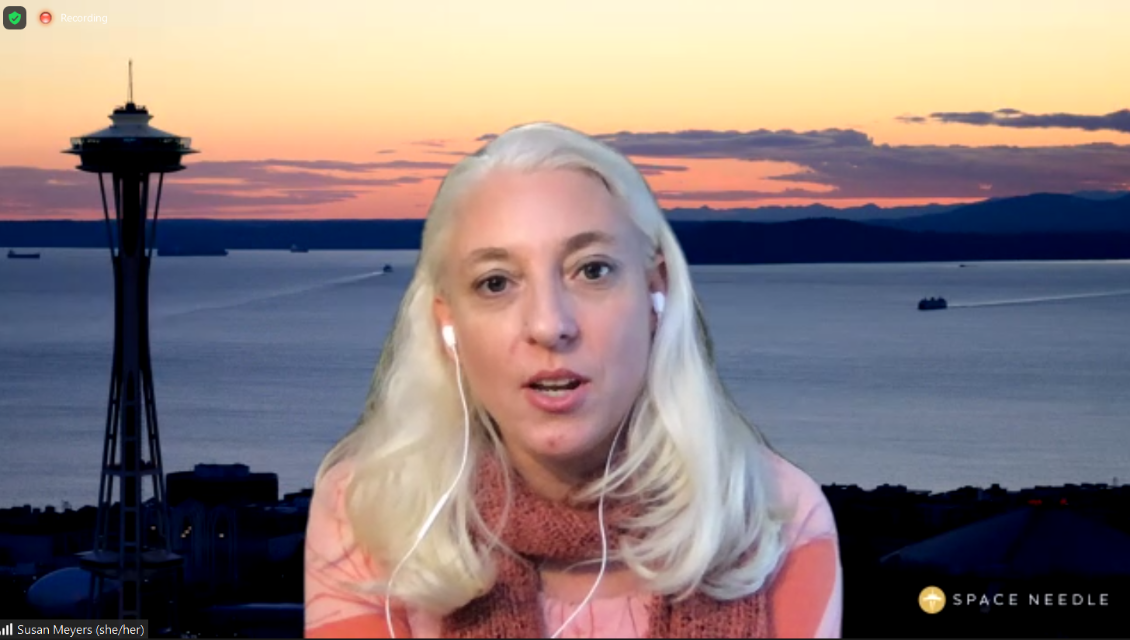
Dr. Susan Meyers’s favorite Zoom backgrounds this year have been her visual homages to the Seattle skyline.
As we’ve all navigated another unusual year, our Creative Writing Program is glad, once again, to be able to celebrate the power of words—especially as they help us continue to find meaning and connection across literatures and communities.
This year we’ve introduced some exciting new courses, including “Queer Poetic Memoir” and “Writing Self, Society, Story,” and we’ve benefitted from some amazing visiting writers, both close to home and from across the country. This past fall, for instance, we welcomed New York University’s Dr. Urayoán Noel as our “virtual visiting writer” to present on his new bilingual poetry collection, Transversal, just released by the University of Arizona Press. In winter quarter, our next virtual Dr. Divya Victor of Michigan State University, presented a moving discussion of her new book, Curve, published last year by Nightboat. Alongside these online guests, we’ve also been thrilled to welcome back some of our most popular guest instructors, including Anastacia Renee Tolbert and Daemond Arrindell, who will serve as our spring visiting writer—and we’re delighted to welcome our newest creative writing instructor, Ramón Isao, who will be teaching “Introduction to Creative Writing” this spring!
Writing Studies
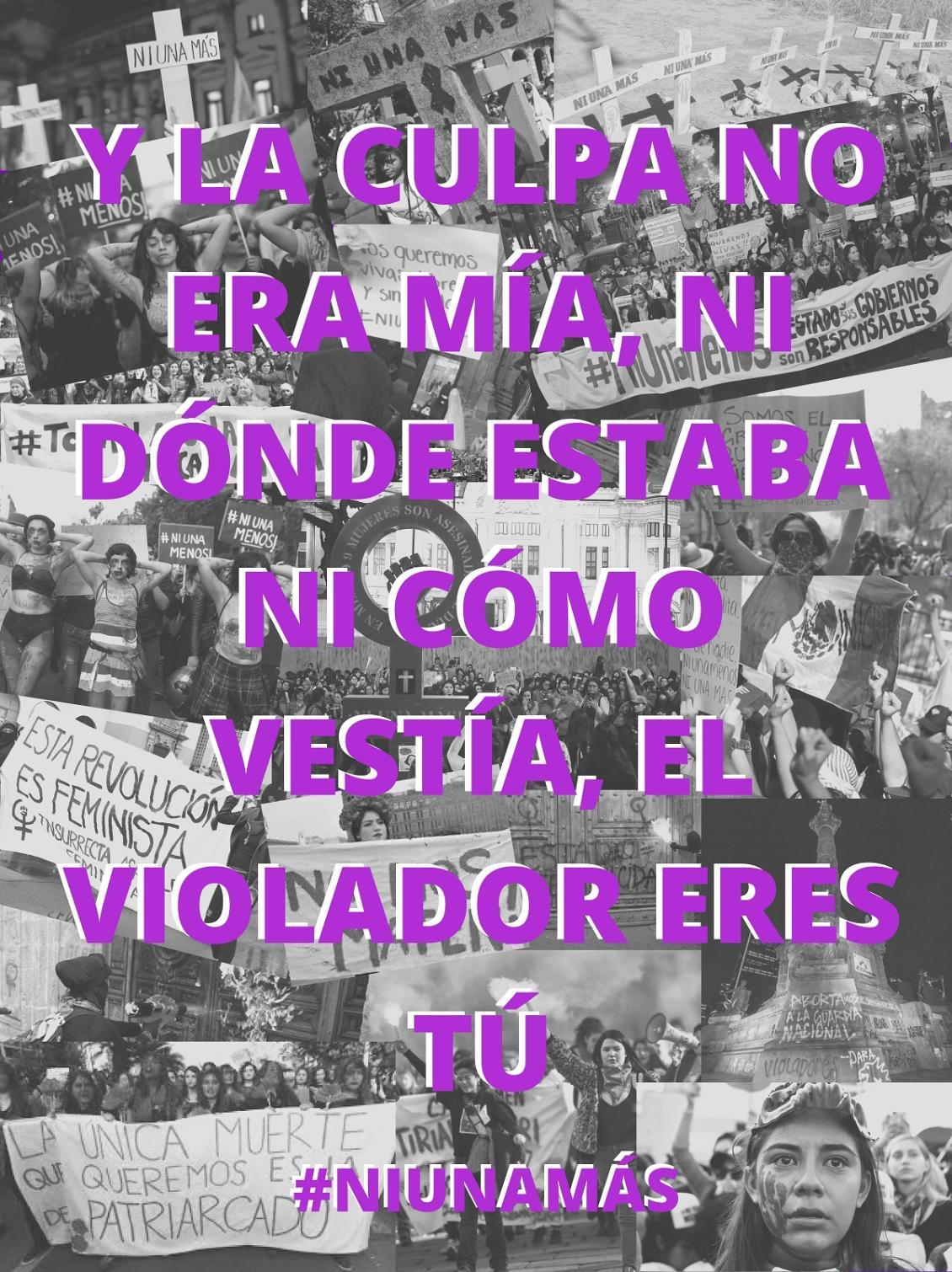
Final Project by English major Alexandra McGew for Dr. June Johnson Bube's "Writing about Writing" course
2021 saw the graduation of nine students with Writing Studies minors. These students represented diverse majors—Creative Writing, Humanities, English, Interdisciplinary Liberal Studies, Environmental Studies, and Mathematics. The Writing Studies Minor seeks to tap into the current vital stream of Writing Studies theory, praxis, and focus on social justice. This burgeoning discipline encompasses numerous subfields—among them, first-year writing, writing-across-the-curriculum, literacy studies, disability studies, professional and technical writing, translingual Englishes, rhetoric and argumentation, community writing, multimodal composing, digital rhetorics, and more. The minor gives students a glimpse of this variety through courses that teach a rhetorical understanding of the relationship among language, literacy, culture, identity and power and that cultivate a love of language, analysis, and writing. Students in this minor encounter new ways to think about writing while they develop rhetorical agency and versatility as writers and build a set of skills documentable by a formal minor professional formation.
In 2020-2022, the minor nurtured its connections with related program opportunities and majors. Students in the minor often take part in producing the annual Seattle University Undergraduate Research Journal, gaining valuable training and experience in producing an online journal. Some students in the minor also work as writing consultants in the Writing Center. To extend the reach of the minor to students in other majors, I have continued to explore cross-listed courses with Communication and Media, Environmental Studies, Psychology, and Interdisciplinary Liberal Studies. Dr. Susan Meyers’ course “Grant Writing,” now offered regularly, teaches foundational knowledge and skills in this important area applicable in multiple professions. Students are also encouraged to seek out internships to acquire job skills.
The Writing Studies minor continues to offer several new courses a year. In Spring 2020, a new course “Writing about Writing: Theory and Practice” incorporated theories from two key movements in the discipline, Teaching for Transfer (TFT) and Writing about Writing (WAW). Despite the challenges of the Zoom environment, students in this class produced creative, memorable multimodal compositions, including brochures, photo essays, zines, videos, and podcasts. In Winter 2021, I taught a literary studies-writing studies hybrid course, “Genres of Western American Literature,” exploring how genres enable stories and can disrupt and recast societal perceptions of the Western landscape and people. Students produced memorable creative nonfiction pieces depicting their own place-identity connections as well as lively multimodal presentations incorporating maps, photos, video, and music to contextualize and historicize the texts we read.
The Writing Studies minor is a developing program with plans to branch out into cultural rhetorics and more opportunities for professional formation. The minor welcomes students no matter what career path they are envisioning!
Writing Center
by Hidy Basta
One of my tasks is to organize and analyze our Writing Center data looking for trends, analyzing needs and finding opportunities to add resources. The focus has been always to learn from student feedback on their experience at the Writing Center.
This year, looking at student feedback on writing center visits was a different experience from the usual quantitative ratings. The feedback forms had longer and personable comments that exceeded the professional utility of their consultation to more elaborate ones that touched on connection to community, stress reduction, affirmation, validation, kindness, patience, wisdom, knowledge, resourcefulness, friendliness, and generosity. While the comments are a testimony to how the Writing Center community has worked to support students, I have also read them as a testimony that students who used the Writing Center knew how challenging it was and how far gratitude can go as an antidote to complete exhaustion and burn out. Our team appreciated every single comment. In turn we offer our gratitude to the community that kept us engaged.
Being present to our experiences of the challenges we were facing in the second year of working through the pandemic has helped us to process in practical ways through staff meetings, community days, casual chats, and changes in expectations and policies. Being present to our response has also helped us engage in scholarship and wider conversations about the work of the writing center and writing support.
In spring 21, Writing Center consultants Grace Kohler, Elena Selthun, Karissa Lopez, Kimberly Le, Sarah Shaffer, Sarah Mahl, Finola Schmahl-Waggoner, and Rachel Van Liew captured our experience well in a presentation titled The Writing Center as a Humanizing Space: Adaptability, Resilience, Community, and Defining Values. It was downloaded more than 45 times and has generated many conversations that I was honored to respond to at the Pacific Northwest Writing Center Association Conference.
During summer, Kimberly Le and Finola Schmahl-Waggoner participated in a reading group hosted by the Canadian Writing Centre Association. With many other writing center practitioners in the US and Canada we read Felicia Rose Chavez, The Anti-Racist Writing Workshop: How to Decolonize the Creative Classroom (2021). Kimberly and Finola were then invited to write a blog post about their experience and the ways in which antiracist practices can be implemented in writing center work. https://cwcaaccr.com/2022/01/24/the-anti-racist-writing-center-how-felicia-rose-chavez-is-changing-the-conventions-of-white-centric-academic-writing/
We concluded the year by a virtual sendoff of the Writing Center members of the class of 2021: Charlotte Bryne, Caroline Carr, Bek Johnson, Grace Kohler, Karissa Lopez, Elena Selthun, Sarah Shaffer. We wish them all the best and are delighted to hear their good news.
The Writing Center staff was honored to receive the 2021 Shine Award for best place to work on-campus (student employer). I’m deeply grateful to be a part of this thoughtful and caring community.
Keep in touch with the Writing Center community by checking out webpage, Facebook, and Instagram, @suwritingcenter. Send us your news and what you’ve been up to as well. We love hearing from you.
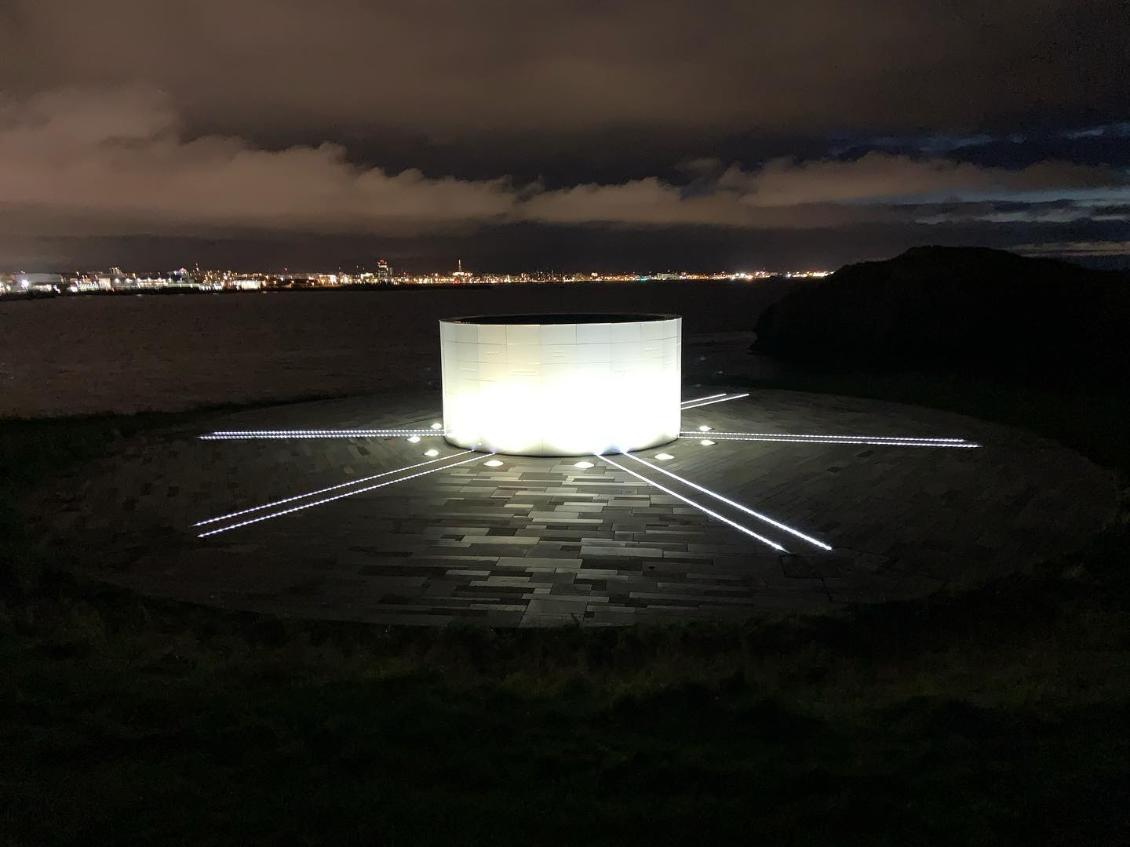
The Monument to Peace by Yoko Ono, situated on Videy Island off the coast of Reykjavik, Iceland.
